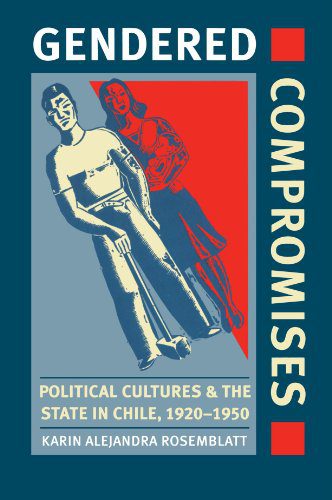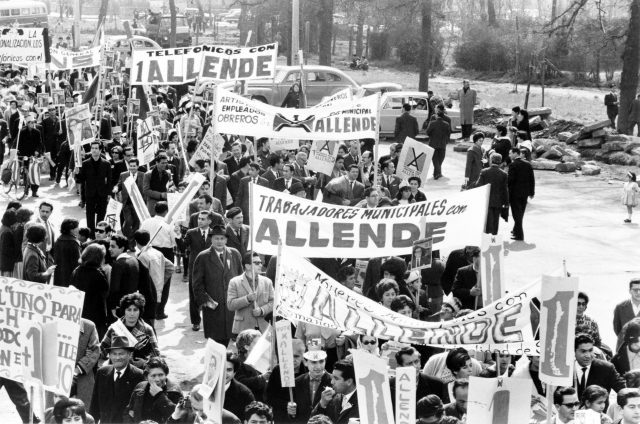 Gender was central to nation-state formation and working-class politics under the Popular Front governments that ruled Chile between 1938 and 1952, preceding Salvador Allende’s socialist regime (1970-1973). The Popular Front sought to industrialize the economy, create an educated and compliant working class, construct a modern welfare state, and solidify the nuclear family as the base of a unified nation.
Gender was central to nation-state formation and working-class politics under the Popular Front governments that ruled Chile between 1938 and 1952, preceding Salvador Allende’s socialist regime (1970-1973). The Popular Front sought to industrialize the economy, create an educated and compliant working class, construct a modern welfare state, and solidify the nuclear family as the base of a unified nation.
The Popular Fronts struck compromises between the national leaders and the growing socialist and communist movements in Chile. One of Karin Rosemblatt’s main contributions is to show that the Popular Front enjoyed the support of various subaltern groups such as the National Labor Confederation (CTCh) and, initially, the feminist group Movimiento Pro-Emancipación de la Mujer Chilena (MEMCh). Focusing on political structures and elite ideology, she analyzes the politics of gender in state policy, and leftist and feminist struggle. The author’s use of oral histories as well as government archival sources helps her paint a complex historical narrative that shows that political and ideological diversity strengthened the Popular Front coalition instead of weakening it.
State officials and employers sought to transform working class men into disciplined and economically stable husbands. With the support of CTCh, they passed the Family Wage Act in 1952, which paid married men more than single workers and reinforced male authority in the family by institutionalizing the notion that men should be primary breadwinners. But in some industries such as mining, employers discriminated against married workers to avoid increasing their pay, and this often prompted married men to claim their status as single. She also shows that although base wages rose overall in masculinized fields like mining, construction, and transportation, they stagnated in the female-dominated realms of hotel service, domestic work, and sewing factories. Feminists in MEMCh called for equal pay between genders and denounced the Family Wage Act, claiming that it excluded women from workforce. Nevertheless, most working-class women supported the family wage system, and National Labor Confederation pamphlets promoted the idea that women belonged in the home.
Rosemblatt traces other conflicts between Communists, progressive feminists, and MEMCHistas, some of whom were politically conservative. MEMCh began in close affiliation with the Communist Party, but many men in the Party rejected the feminists as snobbish and disruptive. Despite a lack of support from the Communist Party, MEMCh succeeded in organizing 58 grassroots committees that lobbied for mothers’ centers, education, healthcare, housing, state funded daycares, increased access to birth control, reform of marriage laws that subordinated women, and legalization of divorce.
As the political climate turned rightward under President Gónzalez Videla (1946-1952), MEMCh did as well. Rosemblatt shows that moderate feminists used close alliances with the state to wrest control of women’s committees from Communists and radicals, and that conservative feminists even helped to suppress Communist organizing among housewives and common women. Cross-class feminist organizing strengthened and promoted the compromise state and the bourgeois-democratic alliance, but feminist success was limited due to the popularity of normative gender ideologies (even on the Left), and feminists’ failure to win over the working class.
Leftists, like the state, wanted to regulate working class life and re-define normative masculinity, but they pursued a socialist brand of discipline and morality. By examining leftist publications and oral histories, Rosemblatt shows that moral prescriptions unified the left and defined its boundaries. Socialists did not place much emphasis on virginity and honor: instead, they valued restraint, morality, and class unity. Although their parents often disagreed, Communist youth therefore felt that they did not have to wait for marriage to have sex. Socialist masculine norms focused on abstention from alcohol and marital fidelity, although many labor leaders engaged in adulterous affairs. Although socialists claimed that an alternative economic system would eliminate patriarchy, Rosemblatt concludes that leftist organizations ultimately reinscribed class and gender hierarchies. Furthermore, socialists and feminists alike appropriated and abrogated working class women’s struggles.
The Popular Front governments gave rise to important social debates about patriarchy and capitalism in modern Chile, and set the stage for Salvador Allende’s peaceful socialist revolution. None of these mid-twentieth century regimes were able to institutionalize gender equality. However, they were certainly preferable to the brutal military dictator Augusto Pinochet, who came into power after the 1973 U.S.-supported coup on Allende’s democratically elected government and enacted widespread human rights abuses during his seventeen-year rule (1973-1990).
Karin Alejandra Rosemblatt, Gendered Compromises: Political Culture and the State in Chile, 1920-1950
You may also like:
Monica Jimenez, Remembering Pinochet’s Chile by Stephen Stern
Elizabeth O’Brien, The Deepest Wounds: A Labor and Environmental History of Sugar in Northeast Brazil




